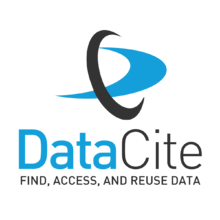DataCite
DataCite is an international not-for-profit organization which aims to improve data citation in order to:
- establish easier access to research data on the Internet
- increase acceptance of research data as legitimate, citable contributions to the scholarly record
- support data archiving that will permit results to be verified and re-purposed for future study.[1]

Background
In August 2009 a paper was published laying out an approach for a global registration agency for research data.[2] DataCite was subsequently founded in London on 1 December 2009[3] by organisations from 6 countries: the British Library; the Technical Information Center of Denmark (DTIC); the TU Delft Library from the Netherlands; the National Research Council’s Canada Institute for Scientific and Technical Information (NRC-CISTI); the California Digital Library (University of California Curation Center);[4] Purdue University (USA);[5] and the German National Library of Science and Technology (TIB).[6]
After the founding of DataCite, leading research libraries and information centres converged for the first official members’ convention in Paris on 5 February 2010. The inclusion of five further members was approved in the office of the International Council for Science (ICSU): Australian National Data Service (ANDS);[7] Deutsche Zentralbibliothek für Medizin (ZB MED); GESIS - Leibniz-Institut für Sozialwissenschaften; French Institute for Scientific and Technical Information (INIST);[8] and Eidgenössische Technische Hochschule (ETH) Zürich.
Technical
The primary means of establishing easier access to research data is by DataCite members assigning persistent identifiers, such as digital object identifiers (DOIs), to data sets. Although currently leveraging the well-established DOI infrastructure, DataCite takes an open approach to identifiers, and considers other systems and services that help forward its objectives.[9]
DataCite's recommended format for a data citation is:
- Creator (PublicationYear): Title. Publisher. Identifier
OR
- Creator (PublicationYear): Title. Version. Publisher. ResourceType. Identifier
DataCite recommends that DOI names are displayed as linkable, permanent URLs.[10]
Third-party tools allow the migration of content to and from other services such as ODIN, for ORCID[11]
Members
- Australia:
- Australian National Data Service - ANDS
- Canada:
- National Research Council Canada - NRC-CNRC
- China:
- Beijing Genomics Institute - BGI
- Denmark:
- Danish e-Infrastructure Cooperation - DeiC
- Estonia:
- University of Tartu (/UT)
- Finland:
- France:
- Institut de l'information scientifique et technique - INIST-CNRS
- Germany:
- German National Library of Economics - ZBW
- German National Library of Medicine - ZB MED
- German National Library of Science and Technology - TIB
- Leibniz Institute for the Social Sciences - GESIS
- Göttingen State and University Library - SUB
- Gesellschaft für wissenschaftliche Datenverarbeitung mbH Göttingen - GWDG
- Hungary:
- Library and Information Centre, Hungarian Academy of Sciences - MTA KIK
- International:
- ICSU World Data System - ICSU-WDS
- Italy:
- Conference of Italian University Rectors - CRUI
- Japan:
- Japan Link Center - JaLC
- Netherlands:
- TU Delft Library
- Norway:
- Republic of Korea:
- Russia
- South Africa:
- South African Environmental Observation Network - SAEON
- Sweden:
- Swedish National Data Service - SND
- Switzerland:
- CERN - European Organization for Nuclear Research
- Swiss Federal Institute of Technology Zurich - ETH
- Thailand:
- National Research Council of Thailand - NRCT
- United Kingdom:
- The British Library - BL
- Digital Curation Centre
- United States:
- California Digital Library - CDL
- Office of Scientific and Technical Information, US Department of Energy - OSTI
- Purdue University Libraries - PUL
- Inter-university Consortium for Political and Social Research - ICPSR
- Harvard University Library
- Institute of Electrical and Electronics Engineers - IEEE
- Knowledgebase of Interatomic Models - KIM
- United States Geological Survey - USGS
- University of Southern California - USC
Other partners
In April 2017, DataCite was one of the founding partners in the Initiative for Open Citations.[12]
References
- "What is DataCite?". DataCite. Retrieved 17 March 2014.
- Brase, Jan; Farquhar, Adam; Gastl, Angela; Gruttemeier, Herbert; Heijne, Maria; Heller, Alfred; Piguet, Arlette; Rombouts, Jeroen; Sandfaer, Mogens; Sens, Irina (2009). "Approach for a joint global registration agency for research data" (PDF). Information Services & Use. 29: 13–27. doi:10.3233/ISU-2009-0595.
- Neumann, Janna; Brase, Jan (20 July 2014). "DataCite and DOI names for research data". Journal of Computer-Aided Molecular Design. 28 (10): 1035–1041. Bibcode:2014JCAMD..28.1035N. doi:10.1007/s10822-014-9776-5. PMID 25038897.
- "University of California becomes founding member of Datacite". Archived from the original on 2014-05-05. Retrieved 2014-05-05.
- "Purdue Libraries becomes founding member of Datacite". 16 February 2010. Retrieved 2010-04-15.
- "TIB becomes founding member of Datacite". Archived from the original on 2014-05-05. Retrieved 2010-04-15.
- "ANDS joins Datacite". Retrieved 2010-04-15.
- "Inist join Datacite consortium". Archived from the original on 2010-03-09. Retrieved 2010-04-15.
- "What do we do?". DataCite. Archived from the original on 17 March 2014. Retrieved 17 March 2014.
- "Why cite data?". DataCite. Retrieved 17 March 2014.
- Thorisson, Gudmundur (2013-05-13). "New ORCID-integrated data citation tool". ODIN Project. Retrieved 7 May 2014.
- "Press". Initiative for Open Citations. 6 April 2017. Retrieved 6 April 2017.